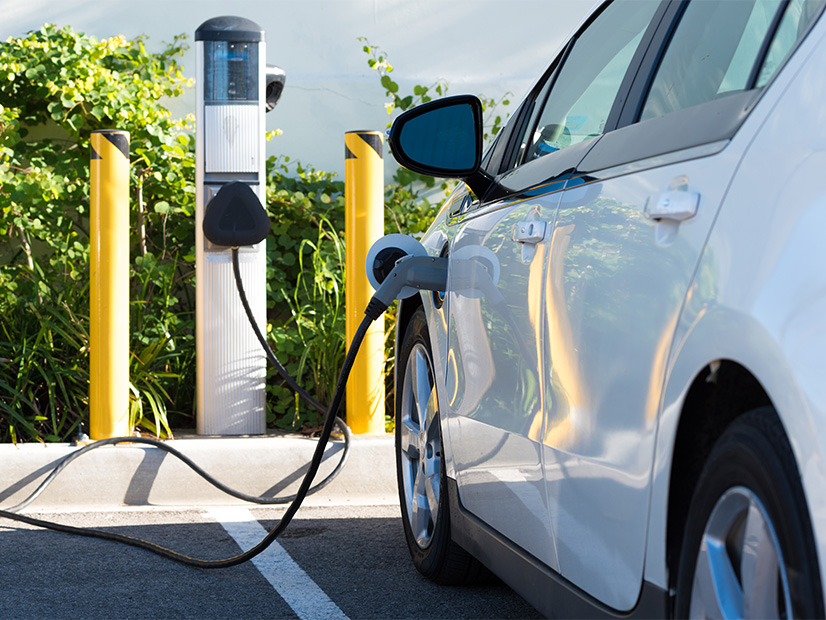New Jersey’s plan to adopt California’s Advanced Clean Cars II (ACC II) rules, which gradually limit the sales of fossil-fuel vehicles and eventually ban them in 2035, will be “crippling” to communities, businesses and the economy and should be abandoned, a coalition of 100 business groups told legislative leaders Tuesday.
A two-page letter crafted by the New Jersey Business and Industry Association (NJBIA) and sent to Senate President Nicholas Scutari and Assembly Speaker Craig Coughlin, both Democrats, said the plan would impose “a substantial expense on property taxpayers, without a necessary funding mechanism, for building and maintaining robust charging infrastructure.”
The letter, produced under the name New Jersey Business Coalition, comes midway through the public comment period held by the New Jersey Department of Environmental Protection to solicit comments on the rules in preparation for their implementation. The period, which runs from Aug. 21 to Oct. 20, includes a Sept. 21 public hearing.
Alongside the NJBIA, one of the state’s largest business groups, the letter signers included about two dozen regional and local chambers of commerce, and associations such as the New Jersey Motor Truck Association, New Jersey Tourism Industry Association, NAIOP-NJ, the New Jersey Bankers Association and the state Retail Merchants Association.
“We share the governor’s desire to reduce carbon emissions, but the significant disadvantages of this proposal greatly outweigh any potential benefits,” the coalition said in a release.
Asked about the letter, Bailey Lawrence, a spokesman for Gov. Phil Murphy (D), said his administration “will continue to advance its pursuit of a clean energy future, including through voluntary, incentive-based EV programs that preserve consumer choice while putting money back in the pockets of hard-working New Jerseyans.”
Increased Burden
As adopted by California last August, ACC II requires car manufacturers to provide an increasing percentage of zero-emission vehicles (ZEVs) for sale each year. It defines zero-emission vehicles as battery-electric, hydrogen fuel cell or plug-in hybrid. (See Calif. Adopts Rule Banning Gas-powered Car Sales in 2035.)
The regulation starts with a 35% ZEV sales requirement for model year 2026, increasing to 68% in 2030 and reaching 100% in 2035. ACC II also includes increasingly stringent low-emissions vehicle standards aimed at reducing tailpipe emissions of gasoline-powered cars and heavier passenger trucks.
When state officials in March outlined the process for adopting ACC II, environmentalists at a public hearing into the process urged the state to approve the rules by the end of the year so they would affect 2027 vehicles sales. DEP officials concurred with the plan but said it would be tough for the state to move that quickly. (See Enviros Demand NJ Move Faster on 100% EV Rule.)
The coalition letter, saying the ACC II plan is “impractical and misguided,” argues the rules would “inequitably strain the limited resources of families, businesses (and) governments” because of the far higher costs of EVs than fossil-fueled vehicles and the infrastructure costs of charging stations. In addition, by forcing the purchase of EVs, the letter says, the rules would elevate the demand for electricity above the level the grid can handle.
“New Jersey residents should have the ultimate choice in the vehicles they purchase,” the letter states. “By denying thousands of New Jerseyans access to an affordable vehicle, this mandate would be crippling to our communities, businesses, economy and labor workforce, and would exacerbate income inequality in our state.”
“Even with historic investments over the next decade, there is no guarantee that the infrastructure to support such a massive network of charging stations can be built in just 12 years in a reliable manner and maintained to support our large population,” the letter adds. It argues that rather than “doubling down” on EVs, the state also should consider vehicles powered by compressed natural gas (CNG), propane auto-gas, hydrogen and renewable diesel, as well as hybrid cars.
The letter urged the legislators to reject ACC II and delay taking action until the legislature can vote on the issue.
Increasing EV Adoption
The state had 93,000 EVs at the end of 2022, according to the Board of Public Utilities, well below the state’s target of 330,000 registered light-duty EVs by 2025. The number of EVs also is a tiny proportion of the estimated 6 million light-duty vehicles registered in the state.
Washington, Oregon, New York, Massachusetts, Virginia and Vermont already have adopted the California ACC II program, and Colorado, New Mexico, Maryland, Delaware, Maine, Connecticut, D.C. and Rhode Island are considering the rules, according to the Natural Resources Defense Council (NRDC). (See NM Sets Course to Adopt New Clean Vehicle Rules.)
A report released by the NRDC and the Sierra Club in May concluded that if the state adopted ACC II, about 16% of vehicles sold in the state would be EVs by 2030 and 94% would be EVs by 2050, depending on how it was adopted. The report stated that under a “business as usual” approach in which ACC II is not adopted, about 30% of vehicles in the state would be EVs, but it would remain at that level. (See NJ EV Charger Plan Advances as Enviros Demand ACC II Adoption.)
“The fact is that ACC II provides significant benefits to New Jersey (up to $97 billion in net societal benefits),” Kathy Harris, NRDC’s senior clean energy advocate, wrote in an email to NetZero Insider in response to the coalition letter. The gradual increase in required EV sales gives the state and private developers time to expand charging infrastructure in the state, she said.
“Importantly, ACC II will not prevent NJ drivers from purchasing affordable vehicles, as the regulation only affects new vehicle sales, and will instead expand the clean car options available for sale within New Jersey,” she said.



